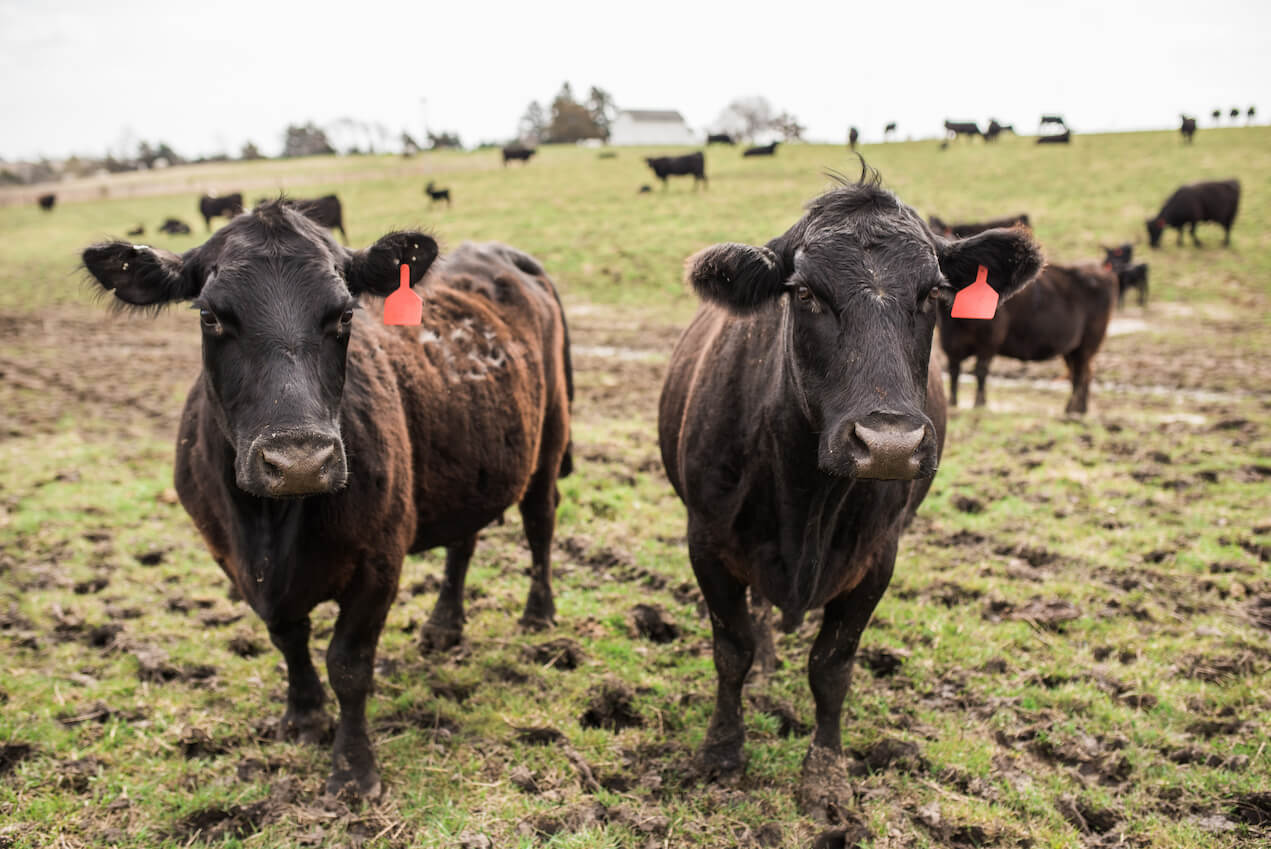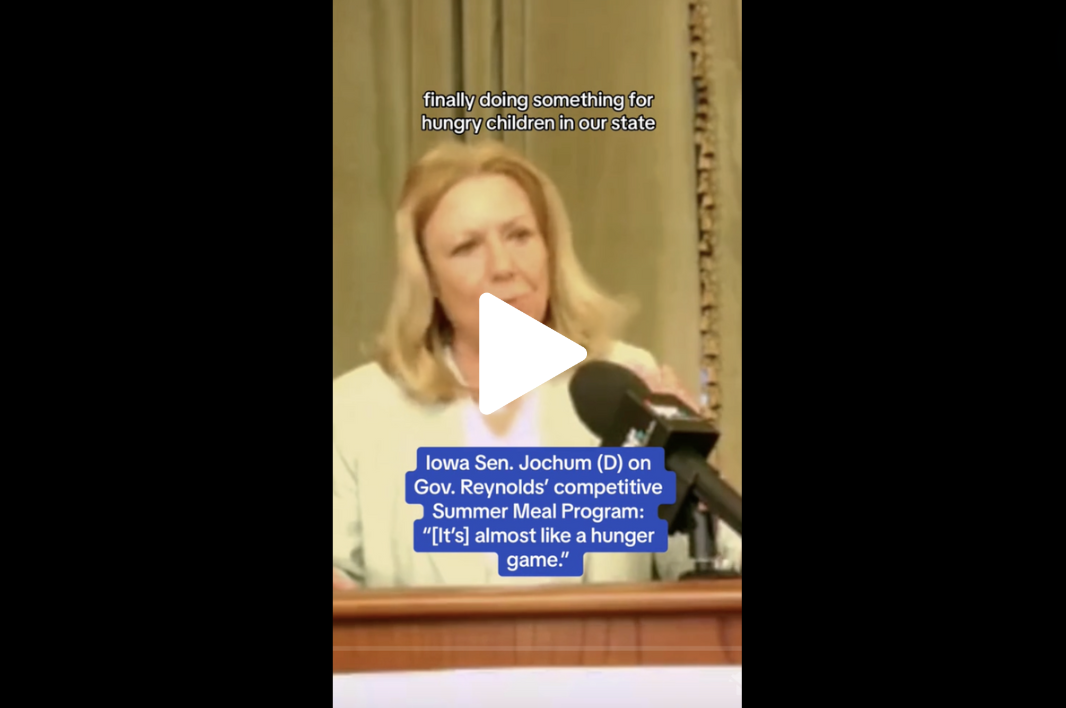
Photo: Getty Images, Teddi Yaeger
The price of beef at the grocery store has gone up, but Iowa cattle producers say they’re seeing their income dry up while the four major beef packers who control the industry are raking in billion-dollar profits.
Faced with angry producers in smaller cattle-producing states, a bipartisan coalition of senators is looking to advance a bill that would mandate the country’s beef packers be more transparent about what they’re paying to farmers who raise cattle.
Though the Cattle Price Discovery and Transparency Act has been introduced in Congress before, this latest version might be producers’ best chance at leveling the playing field.
Here’s what’s at *steak.*
What’s the issue?
Bob Noble has been raising Black Angus cattle on a feedlot in Riceville, Iowa, since the 1980s. He’s also the president of the Iowa Cattlemen’s Association, which advocates for the producers he says are among the last independent animal raisers around.
“There’s almost no neighbors around me that own the pigs anymore — they just put up a building and a corporate deal puts pigs in there,” Noble said. “Ownership is gone.”
[inline-ad id=”0″]
That’s partly because of the large poultry and pork packers that dominate those markets, locking in private contracts and buying certainty for their animals, and giving farmers almost no choice in the matter if they want to make a living. And he’s worried beef packers are now going down the same road.
To keep Iowa’s beef producers on an even keel with the big cattle states like Texas and Colorado, Noble’s organization has been pressing for both more transparency in the way cattle are bought by the packing companies, as well as regional mandatory minimum pricing.
“I think this bill will more even the leverage and level the playing field between independent cattle feeders and packers,” Noble said. “I think we can get better prices for our cattle.”
Packing companies directed questions to their lobbying firm, the North American Meat Institute (NAMI), which has come out against the bill.
NAMI noted a study directed by Congress found such contracts, called alternative marketing arrangements, help producers manage their operations more efficiently and produce better-quality beef, and that “supply and demand were responsible for low cattle prices.”
[inline-ad id=”1″]
What do packers have to do with it?
Four big packers now control a vast majority of the beef market in the US. They are Arkansas-based Tyson Foods, Minnesota-based Cargill, and Brazil-based JBS and National Beef.
In 1977, the four firms slaughtered around a quarter of the country’s total cattle. But consolidation of the industry spurred by a shift toward larger processing plants meant they slaughtered 71% of cattle by 1992. In 2018, the four combined to slaughter 85% of grain-fattened cattle made into steaks, roasts and other cuts of meat, according to the USDA.
That consolidation pushed out smaller packers along the way. But it hasn’t meant lower prices: In 1995, a pound of ground beef cost $1.40. By 2021, it was $4.60. A pound of sirloin steak was between $4 and $5 before 2000; by 2021, it was just over $11.
The big packers have raked in those profits: JBS, for example, had revenues of $18 billion between July and September of last year, an increase of 32% over the same time in 2020.
[inline-ad id=”2″]
Those profits, however, haven’t found their way to the cattle producers themselves, who now make even less: Decades ago, they made more than 50 cents to every dollar a consumer paid for beef. In 2020, that number was just 37 cents.
“And it’s gotten worse,” Noble said, noting both COVID plant shutdowns and a 2019 fire at a Tyson packing plant meant even fewer places for his cattle to go, eating into his income.
What’s the fix?
Some are trying the courts for a remedy, like the class-action lawsuit brought by the Ranchers-Cattlemen Action Legal Fund, alleging the big four packers violated the Sherman Antitrust Act by conspiring to suppress the price of cattle and increasing the price of beef. That suit is still pending.
The Iowa Legislature has also tried to help, approving a grant fund promoting “butchery innovation and revitalization” intended to introduce more independent meat lockers into the market that was signed by Gov. Kim Reynolds in June of 2021.
Out of the last two years it’s been introduced, the federal Cattle Price Discovery Act has the best chance right now, Noble said. Both President Joe Biden and U.S. Secretary of Agriculture Tom Vilsack, a previous Iowa governor, endorsed it, and Sen. Debbie Stabenow, the chair of the agriculture committee, agreed to give it a hearing, Noble noted.
[inline-ad id=”3″]
Noble also has a willing ear among his home state senators: Sens. Chuck Grassley and Joni Ernst, both Republicans, were among 10 original cosponsors of the bill, introduced Nov. 17. Since then, another seven senators have added their names, for a total of eight Republicans and nine Democrats, a remarkably bipartisan showing for the era.
“While retail meat prices continue to rise, many of Iowa’s independent cattle producers who participate in the negotiated cash market are facing challenges and taking losses because they unfairly shoulder the burden of price discovery for cattle producers in other states and regions,” Ernst said in November.
“This bipartisan bill is the best opportunity we have to make real reform in the cattle market this year, and I’ll continue to work with my colleagues to get this across the finish line,” Grassley said when the bill was reintroduced at the end of March.
[inline-ad id=”4″]
Nevertheless, the bill still faces off against the meatpackers and the larger cattle-producing states.
“It’ll be an uphill battle, and the reason is the big cattle states oppose it–they like it just the way it is,” Noble said. But he remained optimistic: “It’s the first time we’ve had a chance in a long time.”
By Amie Rivers
4/3/22
Iowa Starting Line is part of an independent news network and focuses on how state and national decisions impact Iowans’ daily lives. We rely on your financial support to keep our stories free for all to read. You can contribute to us here. Also follow us on Facebook and Twitter.
[inline-ad id=”0″]
Politics

Biden marks Earth Day by announcing $7 billion in solar grants
The Biden administration on Monday announced the recipients of its Solar For All Program, a $7 billion climate program that aims to lower energy...

6 terrifying things that could happen if the Comstock Act is used to target abortion
Does 1873 sound like a really, really long time ago? Well, that’s because it is—but if Republicans and far-right anti-abortion activists have their...
Local News

No more Kum & Go? New owner Maverik of Utah retiring famous brand
Will Kum & Go have come and gone by next year? One new report claims that's the plan by the store's new owners. The Iowa-based convenience store...

Here’s a recap of the biggest headlines Iowa celebs made In 2023
For these famous Iowans, 2023 was a year of controversy, career highlights, and full-circle moments. Here’s how 2023 went for the following Iowans:...





